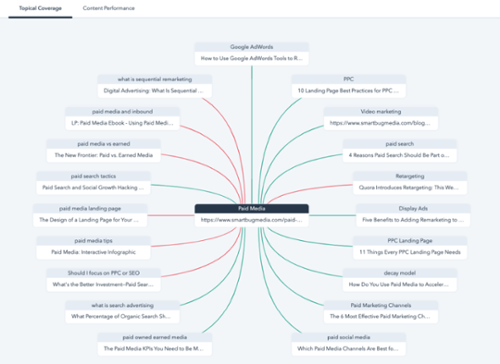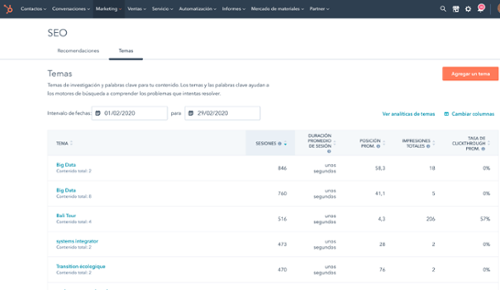How to create a SEO strategy on HubSpot
Do you know what Search Engine Optimization (SEO) is? If you are an expert in Marketing, indeed you do; if you are not, do not worry because, in this...
By Role
By Industry
By Target Customer
What We Offer
We drive business growth by improving operational efficiency through process optimization, smart automation, and cost control. Our approach boosts productivity, reduces expenses, and increases profitability with scalable, sustainable solutions
Customer Experience
We design memorable, customer-centered experiences that drive loyalty, enhance support, and optimize every stage of the journey. From maturity frameworks and experience maps to loyalty programs, service design, and feedback analysis, we help brands deeply connect with users and grow sustainably.
Marketing & Sales
We drive marketing and sales strategies that combine technology, creativity, and analytics to accelerate growth. From value proposition design and AI-driven automation to inbound, ABM, and sales enablement strategies, we help businesses attract, convert, and retain customers effectively and profitably.
Pricing & Revenue
We optimize pricing and revenue through data-driven strategies and integrated planning. From profitability modeling and margin analysis to demand management and sales forecasting, we help maximize financial performance and business competitiveness.
Digital Transformation
We accelerate digital transformation by aligning strategy, processes and technology. From operating model definition and intelligent automation to CRM implementation, artificial intelligence and digital channels, we help organizations adapt, scale and lead in changing and competitive environments.
Operational Efficiency
We enhance operational efficiency through process optimization, intelligent automation, and cost control. From cost reduction strategies and process redesign to RPA and value analysis, we help businesses boost productivity, agility, and sustainable profitability.
Customer Experience
Marketing & Sales
Pricing & Revenue
Digital Transformation
Operational Efficiency
3 min read
Por Katherine Dixon | May 29, 2025
3 min read
Por Katherine Dixon | May 29, 2025
What is SEO and why is it important? How long does it take to see results in SEO? These are some of the questions that clients ask when they want to better understand the process and how they can benefit from it.
Let's get started! The idea of this article is to make you aware that if you have a business with a website and you want to appear in the top searches on Google, you need to know that it depends on implementing a consistent SEO strategy to achieve it. It's not a one-time thing.
>>How to audit your business SEO?<<
Search Engine Optimization (SEO) is a fundamental element for success in the digital world. Learn the basic SEO recommendations in HubSpot that you shouldn't ignore to improve content and optimize the user experience on your website.
Index:
We can describe SEO as a set of practices and strategies used to improve visibility and ranking in the organic search results of search engines such as Google, Bing, and Yahoo. Its main goal is to increase organic traffic by attracting the most relevant users to your website. Its functioning is based on how search engines crawl, index, and rank websites. Below, we will go through the step-by-step process of how it works:
Crawling: Search engines use automated programs known as "crawlers" or "spiders" to navigate the web and discover new pages and content. These crawlers follow links from one page to another, indexing each page they find.

Indexing: Once a crawler finds a page, it adds it to an index, which is a huge database that stores information about all the web pages it has found. During this process, the crawler analyzes the content of the page, including text, images, and other multimedia elements.
Ranking Algorithms: Search engines use complex algorithms to determine the relevance and order in which pages will appear in search results. These algorithms analyze various factors such as the quality and relevance of the content, site authority and popularity, site structure, user experience, among others.
Keywords: Keywords are terms or phrases that users enter into search engines to find relevant information. SEO involves researching and selecting relevant keywords for the business and industry, and then optimizing the website's content to naturally and coherently include those keywords.
On-Page Optimization: On-page optimization involves making changes to the content and code of a page to make it easier for search engines to understand. This includes optimizing title tags and descriptions, proper use of headings and subheadings (H1, H2, etc.), readable URL structure, strategic use of keywords, image optimization, and more.
Analysis and Continuous Improvement: As mentioned before, SEO is an ongoing process that requires constant monitoring, along with analysis of the results. Analytics tools are used to evaluate website performance, measure organic traffic, identify improvement opportunities, and make adjustments to the SEO strategy for better results.
>>How to create a SEO strategy on HubSpot<<
HubSpot has a tool that scans all active pages, including pages hosted outside of HubSpot. To access this tool, your account needs to have a Marketing Hub Pro or Enterprise license, and CMS Hub Pro or Enterprise accounts have access to SEO recommendations in the page editor. To access it, follow these steps:
In your HubSpot account, go to Marketing > Website > SEO.
Once in the SEO tool, you can see recommendations such as:
Improving page load time
Historically, it has been a challenge for web developers to measure how quickly the main content of a web page loads and becomes visible to users.
To provide a good user experience, websites should strive to have a Largest Contentful Paint of 2.5 seconds or less. To ensure that you are achieving this goal for the majority of your users, a good threshold to measure is the 75th percentile for page load times, segmented between mobile devices and desktop.
Correctly sized images
Ideally, your page should never display images that are larger than the version shown on the user's screen. Anything larger than that only results in wasted bytes and slows down the page load time.
The primary strategy for displaying properly sized images is called "responsive images." With responsive images, you generate multiple versions of each image and then specify which version to use in your HTML or CSS using media queries, viewport dimensions, etc.
Alternative image attributes
Images can make it difficult for search engines and visitors using screen readers to understand their content. To address this issue, add alternative text to images that describes their appearance and content. This improves the accessibility and SEO of your site.
Voice and mobile search
How can we optimize our content for people who search with their ears, not their eyes? Due to time-saving and convenience, the majority of users currently utilize this functionality, and we need to update our SEO strategy to adapt to this form of search, considering that most voice searches are performed on mobile and smart devices.
SEO Automation
Algorithms learn from experience and detect optimization opportunities more quickly than manual processes. Consider automation to accelerate SEO tasks. Tools help automate repetitive processes, collect and analyze data, generate reports, and take actions to improve the visibility and performance of a website in search engines.
>>SEO and UX: how to retain the user to delight the search engine<<
AI-generated content
Artificial intelligence has gained ground in the past year, supporting the creation of content using valuable tools like ChatGPT, a trending application. It can generate the valuable content your users expect to have a satisfying experience.
Optimizing your content for SEO is essential to improve your online presence and increase website traffic. If you have HubSpot, take advantage of the basic recommendations you should follow to ensure that your content is properly optimized for search engines, using the correct strategies. Keep in mind that at Imagineer, we can provide you with the best advice.

Do you know what Search Engine Optimization (SEO) is? If you are an expert in Marketing, indeed you do; if you are not, do not worry because, in this...

Learn about SEO, how it works within HubSpot, its tools and how to use it to generate more qualified leads for your business, and in what other ways...

Have you considered the importance of the performance of your website?